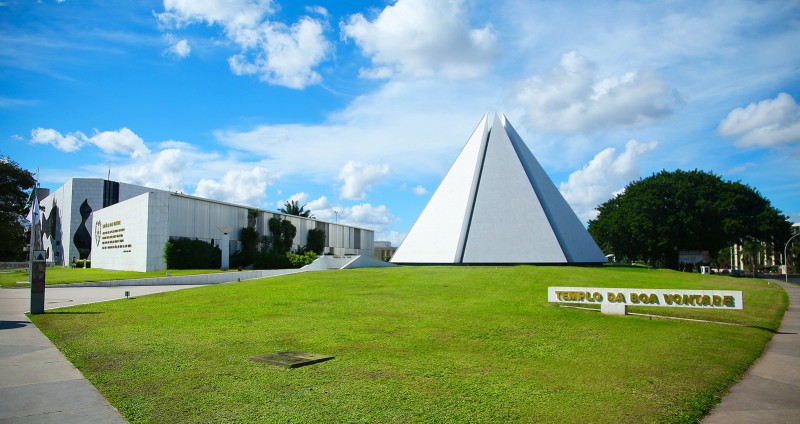Death is Utopia
In the history of Ancient Egypt, with its pyramid constructions that are surprising even for today’s scholars, we see many indications of the belief in Eternal Life.
In Brasília, Brazil, the Temple of Good Will, TGW, the Pyramid of the Blessed Souls, of the Luminous Spirits, is an advance in this direction. One of the biggest differences lies in its universality. Thousands of years ago, the pyramids with their symbolism of perennial existence, let us say, were a privilege destined for a few. The message of the TGW, on the other hand, with the Total Ecumenism, welcomes all of Humanity. The cult of death, which is characteristic of the distant past, has given way to the dynamic of life in all its fullness.

In the Temple of Peace, human and spiritual vitality is nourished by the merciful power of the “Great Architect of the Universe,” as our Masonic brothers put it. On one of its walls, I placed this directive, inspired in Jesus (The Gospel according to John 4:23 and 24): “In this Temple even the stones will cry out that God is Spirt and, as such, those who worship Him must worship in Spirit and in Truth.”
In the TGW, the Ecumenism of the Hearts, enlightened by the understanding of immortal life, is not Utopia, but daily practice. Human beings are truly respected. It never excludes anyone, but rather aggregates the wisdom that originated from the most diverse lines of thinking.

Nestor João Masotti
Nestor João Masotti, former President of the Brazilian Spiritist Federation (FEB), also took part in this initiative of union. He returned to the Spiritual World on September 3, 2014. In fact, as he also believed, he went home, to the plane of existence from where we all came. When he was the secretary-general of the International Spiritist Council, he stressed: “One of the points we need to look for is an understanding between all religions. Naturally, we cannot assume that everyone thinks in absolutely the same way, but we can perfectly well find a way to live side-by-side fraternally. In this case the work of the LGW becomes very significant, because it is helping men to come together to live side by side fraternally, even though we have different doctrinal, spiritualistic, and religious viewpoints.”
Death does not exist

Alziro Zarur
As Masotti also believed, let us give our best in developing this awareness: “Death does not exist!” This is the great cry of the Temple of Good Will, as I wrote at the end of the 1980s on the page “The Scope of the TGW.” This clarification is indispensable when it comes to preventing suicide, which according to estimates by the World Health Organization (WHO) is responsible for the death of one person every 40 seconds in the planet. This is a global public health problem that must be faced up to by society. Alziro Zarur (1914-1979), who would have been 100 years old on December 25, 2014, warned that, “Suicide does not resolve anyone’s anguish.” Let us throw away any taboo there might be and let us work correctly to prevent it. May there always be, starting with children, the proper spiritual, moral, and material instruction, as well as immediate help for those who have already manifested suicidal tendencies. Fraternal Love is capable of preventing numerous tragedies!
Just like Life, Hope never dies! Fighting for them and persevering in doing Good are the right choices.
The comments do not represent the views of this site and are the sole responsibility of their authors. It denied the inclusion of inappropriate materials that violate the moral, good customs, and/or the rights of others. Learn more at Frequently asked questions.